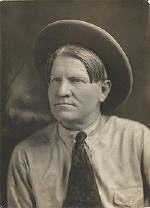
Charles M. Russell - Montana's most famous artist, and, along with Frederic Remington, one of the two most famous artists ever to paint the West - was born in St. Louis, Missouri on March 19, 1864. He came to Montana in 1880, at the age of 16, just four years after Custer's fatal last stand at the Little Big Horn.
His first job in Montana was sheepherder - and he was terrible at it. "I'd lose the damn things as fast as they put 'em on the ranch," he said later. Fired from that job, he helped professional meat hunter, Jake Hoover, spending about two years learning about Indians, wildlife, and Montana's past.
In 1882 he went to work as a cowboy, working as night wrangler on cattle drives and round-ups. During the bitter cold winter of 1886-1887, Charlie was staying on the O.H. Ranch. In a reply to the owners of the ranch who asked about the condition of their herd, Charlie drew a sketch of a gaunt, starving cow surrounded by wolves, and titled it "Waiting for a Chinook" The sketch was reproduced in the Montana newspapers, and is still today one of Charlie's best-known pictures.
During his days on the range, Charlie always had a sketch pad and some brushes with him, and occasionally he tried to make his living as an artist. But he always went back to working as a cowboy, saying he'd "rather be a poor cow puncher than a poor artist." But in 1896 his situation turned around. He married a pretty young girl named Nancy Cooper, and as soon as she took over the business end of his art career, things began to look up. Within just a few years Nancy was charging collectors what Charlie always called "dead man's prices."
Charlie Russell died on October 24, 1926, of heart failure, and he was deeply mourned by the entire state of Montana. In Great Falls, city offices and schools were closed on the day of his funeral. His first roundup boss, Horace Brewster, told the newspaper, "He never swung a mean loop in his life, never done dirt to man or animal, in all the days he lived."